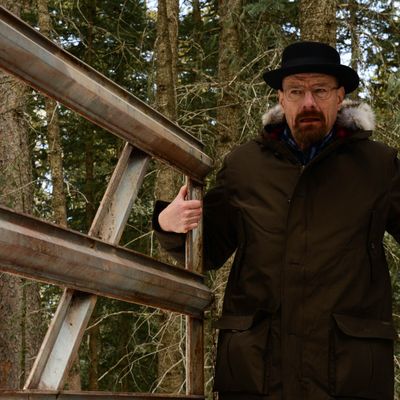
He was always Heisenberg.
I know this isnÔÇÖt a revelation nor am I the first one to say it, but long before his tightie-whitie-clad first cook, Walter White was already breaking bad.
Its pretty clear that Vince Gilligan and the brilliant storytellers around him dont want us to reduce morality to binary terms  good and evil are simply magnetic poles that influence the actions of the characters caught between them. Weve seen Walt do both generous things and horrible things  and we were certainly asked to believe that all of them were motivated by a single, seismic moment in his life. This moment was his origin story.
Now IÔÇÖm going to go on a tangent about superheroes because, hey, I spend way too much money on comic books and I have to justify it somehow.
The conventional thinking is that Bruce Wayne became Batman on the day that his parents were murdered. This is his origin story. We all know it.  We all accept it. We all love it. Because it makes sense. Your parents are gunned down in front of you, so of course you vow an unending vendetta against crime and then dress up like a winged mammal to exact it.
Except thatÔÇÖs not how Bruce Wayne became Batman.
Bruce Wayne was already Batman.
Because millions upon millions of people are murdered by criminals all the time ÔÇö especially in comic books. But the sons and daughters of those people do not become Batman. But Bruce Wayne?
Bruce was different. There was something inside him. Lying dormant. He just needed something powerful enough to awaken it.
In chemical terms, this is called a catalyst.
I think it is, anyway. I kind of hated chemistry. I guess I could probably look up ÔÇ£catalystÔÇØ on Wikipedia, but IÔÇÖm afraid it will mean something different than I think it means and therefore put me in a retroactive tailspin for having used it wrong all this time and more important, ruin my point. My point! Yes. There is one!
In the very first episode of this masterful show, Walter White is told he has advanced, inoperable, most likely fatal lung cancer. And in that moment, time slows down. Sound drops out. It is intense and it is effective and the reason we are starting here is because this is the start. The origin. The moment Walt begins his journey. The moment he becomes Heisenberg.
We know all this because Walt tells us so. The ticking time bomb that is the cancer becomes his rationale for everything that comes next; the lying, the lawbreaking, the child-poisoning.
But then the cancer goes away.
This is the equivalent of Bruce WayneÔÇÖs parents suddenly reappearing to him and saying, ÔÇ£We had to fake our deaths when you were a kid and weÔÇÖve been in witness protection all this time, and weÔÇÖre so sorry, but the guy who shot us was actually an FBI agent helping us and he wasnÔÇÖt even a criminal and we love you, so can we have our pearls back and NOW YOU DONÔÇÖT HAVE TO BE BATMAN ANYMORE!!!ÔÇØ
But would Bruce stop being Batman?
No. He would not. Because he is Batman. And once the catalyst has  well, catalyzed? There is no going back.
And this is how I know the same is true with Walter White.
The first scene of the season-three finale, ÔÇ£Full MeasuresÔÇØ is a flashback, which, as you might surmise, I have an affinity for. In this moment from the distant past, we see a newly married Walt and Skyler being shown a house by a real-estate agent. This house, of course, is the one they will end up living in for the next couple of decades, the one that will ultimately have the word ÔÇ£HeisenbergÔÇØ scrawled across its living room wall. But Walt doesnÔÇÖt know any of that yet.
So heres your homework. Go and watch that scene. Hear Walter Whites voice as he frowns upon the modesty of the home he has not yet purchased. Look into Walter Whites eyes when he says, I dont think this is gonna be enough. Is it ambition you see? Or is it something else? And while were at it 
LetÔÇÖs rewind. LetÔÇÖs go back to the beginning of the scene. The first moments of the episode. Quiet. Moving off a single unlit log in a fireplace as we find the real-estate agent, standing in the empty living room, jotting notes on his pad, waiting for his potential clients.
And how do we know Walter White has arrived?
HeÔÇÖs the one who knocks.
Damon Lindelof is a co-creator of Lost and the showrunner for the upcoming HBO series The Leftovers.

